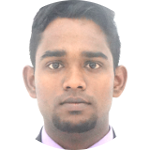-
Member Login
- Home
- About
- Institute Groups
- Membership
- Events
- News & Publications
- Institute Programs
- Resources
- Jobs Board
- Contact Us
- Site Info
Chanjief Chandrakumar
Chanjief Chandrakumar
Abstract | An absolute sustainability assessment method for estimating environmental impact reduction targets: A case study of the New Zealand agricultural sector
Most of the conventional environmental sustainability assessment methods, such as Life Cycle Assessment and carbon footprinting, evaluate economic goods and services using an unit of analysis of arbitrary magnitude and defined in terms of the nature or the function of the studied goods or services (e.g. management of 1 tonne waste, consumption of 1 kg kiwifruit). As such, these methods overlook the variations in the overall magnitude of production and consumption patterns for the examined goods and services. As a result, the progress achieved in mitigating environmental challenges is likely to be slow and insignificant given the global increase in demand for many goods and services. Therefore, in this study, we propose a complementary absolute sustainability assessment method to evaluate the environmental performance of an economic sector against a set of absolute environmental boundaries through integrating two popular frameworks: Sustainable Development Goals (SDGs) and planetary boundaries (PBs). Initially, to evaluate the environmental performance, the indicators relevant to environmental problems were chosen from the SDGs. Secondly, the chosen indicators were compared with the control variables of the PBs to establish the linkages between the two frameworks. Thirdly, the sectoral environmental boundaries were estimated by translating the global PBs to the national, and then to the sectoral level. This means that the actual sectoral performance can be benchmarked against the estimated boundaries to identify whether the sector has already transgressed its boundaries (or not). As this method involves value-based modelling choices when disaggregating the PBs at the lower levels, a scenario analysis was conducted based on different impact allocation principles – for a case study of the New Zealand agricultural sector.
Overall, this absolute sustainability assessment method has potential to guide policy- and decision-makers in transforming the New Zealand agriculture sector (and other sectors) to operate within environmental boundaries as well as to operationalise the SDGs at the sectoral level effectively.
Bio | Chanjief Chandrakumar
 Chanjief Chandrakumar is a Doctoral Research Scholar at the New Zealand Life Cycle Management Centre (NZLCM Centre), Massey University, New Zealand. His PhD aims at developing an integrated approach to operationalizing Sustainable Development Goals within the Earth’s carrying capacity. Prior to commencing his PhD at Massey, Chanjief worked at the University of Peradeniya and University of Jaffna, Sri Lanka as an Assistant Lecturer. Moreover, for the 2016 academic year, Chanjief was a T.I.M.E European Summer School Scholar in Sustainability and the Global Economy at KTH Royal Institute, Sweden. Chanjief graduated from the University of Peradeniya in 2016 with a first-class after studying Production Engineering.
Chanjief Chandrakumar is a Doctoral Research Scholar at the New Zealand Life Cycle Management Centre (NZLCM Centre), Massey University, New Zealand. His PhD aims at developing an integrated approach to operationalizing Sustainable Development Goals within the Earth’s carrying capacity. Prior to commencing his PhD at Massey, Chanjief worked at the University of Peradeniya and University of Jaffna, Sri Lanka as an Assistant Lecturer. Moreover, for the 2016 academic year, Chanjief was a T.I.M.E European Summer School Scholar in Sustainability and the Global Economy at KTH Royal Institute, Sweden. Chanjief graduated from the University of Peradeniya in 2016 with a first-class after studying Production Engineering.
We acknowledge and value the rights and interests of Indigenous Peoples in the protection and management of environmental values through their involvement in decisions and processes, and the application of traditional Indigenous knowledge.

